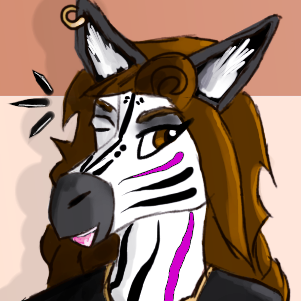Of course it’d be pretty horrific to see a stuffed deer head mounted on the wall – amongst a group of anthro deer especially, but amongst ANY anthro character too, I’d imagine.
But of course it all depends. Whenever we consider such things in an anthro universe, it inevitably comes back to this question of which creatures are “people” and which ones are “actually” animals. Feral versus anthro, I suppose.
My favorite example of this is: consider how the wildebeest in The Lion King aren’t people – they are just a mindless herd of animals into which Mufasa falls and then he’s stampeded to death.
I don’t really have a point here. I just wanted to share a thought that I had while writing my story, which is a setting where birds and fish are NOT anthro, and that’s why it’s “okay” for the seafood restaurant to have a giant swordfish mounted on the wall.


Honestly, I don’t get why a lot of people have a problem with the “anthros and ferals are different species” method. It’s honestly the most realistic, monkeys and apes still exist IRL even though humans are basically “anthro apes” in a sense.
Because it’s the most handwaived approach, basically ignoring the entire question.
While yes, apes and humans exist, both are certainly more different from each other than a fox and yet another fox that walks on two legs. While can be summarized as such, humans aren’t just monkeys that walk on two legs-- theres more differences to both which the “anthros and ferals are the same species” approach usually ignore.
Not to mention, it’s kind of unrealistic to expect all animal to evolve so they look like anthro. Even if all species eventually gain sentience, realistically, not all their bodies would look like anthro, just like how not all caniform (canine-like animal) look the same.
It’s also kind of iffy. Imagine how the anthros would feel about ferals of a similar species as them. Imagine how it’d feel to meet an unintelligent four-legged cat as a sapient two-legged cat. It seems weird, especially if the story backround is dark (maybe less so for less serious story, like children story or comedy).
This doesn’t mean that the “anthros and ferals” approach is wrong– I mean I used it. It also doesn’t mean the author is lazy. There is more to worldbuilding than just species and it’s not impossible the author wanted to focus on another areas of worldbuilding instead. It can also be used brilliantly as the base concept is kind of vague, so you can build on top of it.
It’s theorized that hominids evolved their body plans first, then their intelligence, rather than the other way around. While it’s possible for a non-humanoid animal to develop a high level of intelligence, at least having the ability to manipulate objects in complex ways seems to be a significant factor in the development of higher intellect. Intelligence costs energy, so having a big, wrinkly cerebral cortex (or equivalent) is actually a negative unless you can put it to good use.
Then again dolphins are among the smartest animals on the planet and they just have fins for limbs, so it’s not the only factor.
It seems weird to us because we as humans and thus outside observers ultimately see it as two cats. But we generally don’t look at monkeys or apes in that way, or if we do, we still acknowledge a significant difference. And people do sometimes try to keep monkeys as pets (key word being try - it never works out for either the monkey or the human). An anthro cat might feel more of a reverence for their evolutionary ancestors due to the similarities, but I otherwise don’t think they’d see the “Goofy and Pluto” effect here.
And, of course, the feral cat’s not going to care beyond figuring out if the anthro cat is a threat or a new friend. If anything they’d probably have an easier time if body language carries over.
Honestly, one significant factor to consider is how human-like or animal-like anthros are as well. The ubiquitous “petting zoo people” style of anthro in the furry fandom probably wouldn’t be how an actual humanoid descendant of a non-primate would look, at least assuming similar environmental factors. What we’d probably end up seeing is a more “balanced” mix of human-like and animal traits. Shorter, broader snouts with more complex facial musculature, hands resembling a mix of a paw and a hand but leaning more towards a hand, an overall body shape a bit closer proportionally to their feral ancestors, etc. I feel like Rio Lepidoptera is a good example of what a realistic evolutionary anthro would look like. And at that point there’s definitely a significant difference in physical appearance between the anthro and their evolutionary ancestors, so it would probably make things less weird even from a human point of view.
Fully agree with you here. It’s only anecdotal, but my own experiences with monkeys/humans was that for the longest time I hated monkeys because some of them were a little bit too similar for comfort. And the thing is, in hindsight, humans and monkeys aren’t even that similar. We’re certainly not more similar than a feral and an anthro foxes or wolves.
I think that including and handwaving it (or not mentioning it at all) is a perfectly viable solution, but if it’s mentioned too much without proper handling, it will end up becoming weird, and possibly even an obstacle to proper reading (for example, if you keep referring to feral foxes and anthro foxes as just “fox”, you either need to always be explicit (“the feral fox” and “the ??? fox”), or risk confusing readers).
Plus, and this is probably just be me, but I think it would be weird to include that detail, and even call attention to it, but never explore it.